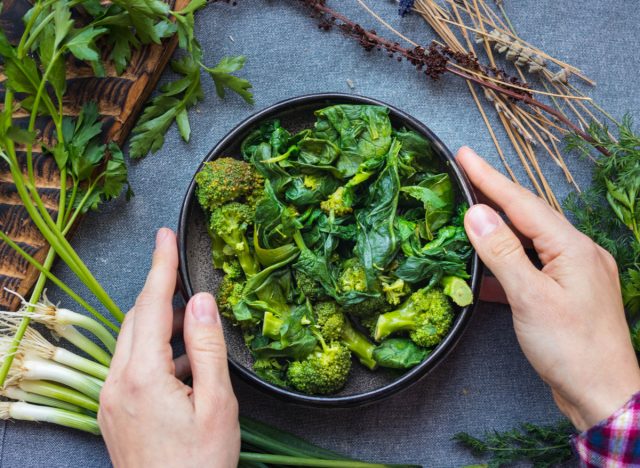Your daily diet directly impacts your gut health, which can affect many different aspects of your health. But sometimes, it can be difficult to know the best foods to eat for your gut.
As a baseline, whole foods that are high in fiber usually help keep your gut happy. For example, fruits and vegetables (and some whole grains) contain polyphenols, which are compounds that improve your gut barrier.
And while eating plenty of vegetables and fruit can provide you with healthy fibers and nutrients to help your gut, research has shown that leafy green vegetables can specifically help feed the good bacteria in your gut and improve your overall gut health.
Read on to learn more about how leafy greens can help your gut, and for more healthy eating tips check out 7 Low-sugar Dessert Recipes You’ll Want to Try Today.


It’s time to saute some kale or make a delicious spinach salad because leafy green vegetables (think spinach, kale, Bok choy, collard greens, etc.) can help your gut bacteria in a unique way.
A study published in Nature Chemical Biology found that these leafy greens contain a unique sugar compound called sulfoquinovose (also known as SQ, because “sulfoquinovose” doesn’t exactly roll off the tongue). The good bacteria in your gut feeds on SQ for energy, so when you’re eating leafy greens, you’re essentially feeding the good bacteria in your gut microbiome.
READ RELATED: The E. Coli Outbreak in the Midwest Is Getting Worse, With 38 People Hospitalized So Far
What happens when we feed the good bacteria in our gut? The more energy that these good bacterias have, the more they’re able to build the protective barriers in our microbiome that are needed for keeping the bad bacteria at bay and stopping them from growing and multiplying.
A healthy gut is important because it affects more than just your stomach. In fact, your gut microbiome has been known to directly impact your cognitive health and impact your risk of neurodegenerative diseases as well.
A report published in Neurology states that the high fiber content of leafy greens can improve your gut health and therefore have neuroprotective qualities, helping to reduce cognitive decline.
At the end of the day, you can’t go wrong with eating whole foods that are high in fiber, like vegetables, for your gut health (not to mention your health in general). But if you’re a fan of leafy greens and can incorporate more of them into your daily meals, you’ll get an extra boost of gut-happy SQ to keep your good bacteria satisfied.
Source:








